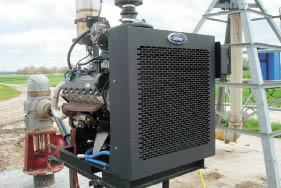
Irrigation is an energy-intensive farming operation. Of the nearly 500,000 irrigation pumps used in crop production nationwide, electricity and diesel remain the most common energy sources. However, volatile gasoline and diesel prices and tightening emission standards are prompting many producers to consider alternative fuels.
New propane-fueled irrigation engines from Ford, GM and other manufacturers provide not only equivalent performance compared with conventional fuels but also added environmental and economic benefits.
The third most-popular fuel in the United States and a leading alternative fuel worldwide, propane is not a new fuel on the farm. Until the 1970s and 1980s, when diesel prices dropped and growers switched equipment, propane heated buildings, fueled tractors and powered irrigation systems across the U.S. Propane is now used on 40 percent of farms, with producers relying on the fuel as an efficient and affordable energy source for grain drying, heating and irrigation.
A byproduct of natural gas refining, more than 70 percent of U.S. propane supplies are produced in the United States and increased production of natural gas has made propane an abundant fuel. According to research from ICF International, propane will maintain its favorable cost differential over gasoline and diesel for at least the next decade, making propane a reliable investment for the short- and long-term.
Propane offers several economic benefits for producers compared to conventional fuels. A two-year study from the University of Nebraska found growers can save as much as $8,000 annually on a new propane engine compared with its diesel counterpart. Propane-fueled irrigation engines cost up to 14 percent less to purchase and operate than diesel.
Growers can maximize their bottom line with propane by monitoring fuel use and tracking pricing, performance and gallons per hour. A producer should sit down with a local propane retailer and develop a purchasing plan to find the best way to save. For instance, producers can take advantage of price breaks during irrigation season when propane pricing tends to fall and diesel prices typically rise.
Closed-loop fuel controls keep propane engines running at peak load efficiency, optimizing fuel use and improving growers' bottom line without sacrificing horsepower or performance. Modern propane engines can be 20 to 30 percent more efficient than older engine models, and consume about 1.6 gallons of propane to generate the same power as one gallon of diesel.
Propane's clean-burning properties and high-octane rating reduce engine deposits and particulate matter, creating additional savings for growers. Because propane requires less oil by volume than diesel and no additional filters or fluids, many producers find propane irrigation engines have a longer life span than their diesel engines.
Growers investing in propane-fueled irrigation not only add green to their bottom line, but to the environment, too. Propane-fueled irrigation engines meet all EPA and California Air Resources Board emission requirements and can cost thousands less than similarly compliant diesel models. Each propane-fueled engine produces up to 24 percent fewer greenhouse gas (GHG) emissions than gasoline and 11 percent fewer GHG emissions than diesel engines.
Additionally, propane is typically transported and stored as a liquid, making it both environmentally friendly and low maintenance compared with other fuels. In its liquid form, propane is more compact, so it can be bought and stored in bulk and doesn't degrade, unlike gasoline and diesel. In the event of a fuel spill, propane will not contaminate the soil or groundwater like gasoline-one of the reasons it's approved for use in organic farming.
The Propane Farm Incentive Program is designed to help growers with the upfront costs of investing in propane irrigation equipment. It can be especially beneficial where drought-like conditions have forced many producers to irrigate early and for longer periods of time.
The program, sponsored by the Propane Education & Research Council (PERC), offers growers nationwide $400 per liter of engine displacement toward new propane-fueled irrigation engines. In return, producers share performance and cost-saving data with PERC for a season, and the information is used for future product development.
For more information about the Farm Incentive Program, and economical and efficient energy irrigation solutions with propane, visit www.agpropane.com.

